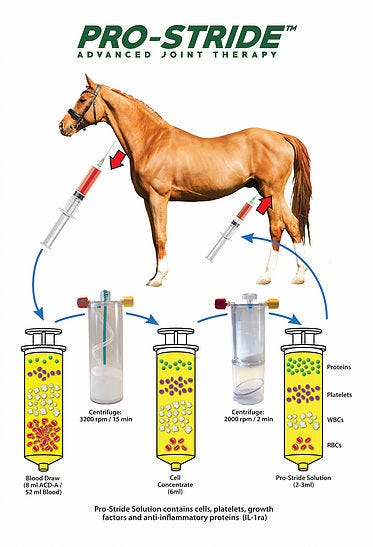Warsaw Company Brings High-Tech Treatments to Horses
 The company's leading product is the Pro-Stride Injection
The company's leading product is the Pro-Stride Injection
Subscriber Benefit
As a subscriber you can listen to articles at work, in the car, or while you work out. Subscribe NowHeadquartered in the orthopedic capital of the world, a Warsaw-based startup is gaining traction as it uses new technology to treat patients with four legs instead of two. Led by two orthopedic industry veterans, Owl Manor Veterinary is adapting human-based programs to benefit horses facing joint or soft tissue ailments, and soon, will be adding man’s best friend to its portfolio. Buoyed by $1.2 million in Series A financing, the young company believes its technologies improve care and convenience when it comes to treating injured horses.
Founded in 2015, Owl Manor Veterinary treats tendon, ligament and osteoarthritis issues in the companion equine area. The company focuses on regenerative medicine, which involves using the horse’s own blood or stem cells to promote healing.
A large portion of the horses that use Owl Manor’s technologies are in the sporting world, used for hunting, jumping and other equine events. The company is working to expand into thoroughbred racing, polo and cart racing.
“Our patient base ranges from the highest-end equine athlete down to the pasture pet,” says Owl Manor Veterinary Chief Executive Officer Mark Schindel.
Owl Manor’s portfolio is currently comprised of three key offerings. The first is a platelet-rich plasma product; a blood sample “spins” in a centrifuge to create a high concentration of platelets that promote healing and repair of soft and hard tissue like tendons, ligaments and bones. A second product uses stem cells from the horse’s bone marrow to treat injuries.
It’s most popular product is the Pro-Stride Injection, which involves concentrating anti-inflammatory proteins and growth factors from the horse’s blood, then injecting it to treat joint osteoarthritis.
“Using blood for healing has been around for a while,” says Schindel. “Equine clinicians are very progressive and always looking for innovative technologies. We’ve just identified a way to provide a better, easier point-of-care solution to treat patients.”
Owl Manor’s products focus on being “point-of-care,” which Chief Operating Officer Mike Leach says greatly increases convenience for the animals’ caretakers.
“There are a few products on the market that address these injuries and diseases, but a lot of those require the animal to stay overnight or for the bone marrow or stem cells to be sent out to be cultured,” says Leach. “That can take anywhere from a few days to a couple weeks. That means multiple trips to the vet or incubation overnight. Our products are all done in less than 30 minutes.”
Leach notes this also reduces the cost of care without sacrificing quality; he says Owl Manor treatments have a better success rate because they produce higher concentrations of cells and proteins to treat the ailments.
“For Pro-Stride, the level of anti-inflammatory proteins are five to eight times higher than what’s currently out on the market,” says Leach. “For our platelet concentrator, we get 90 percent platelet recovery from the sample we pull. That’s quite high compared to some of the other systems that are 20 to 30 percent less than that.”
While the startup is currently focused on the equine market, the company is working to adapt its products for dogs.
“The volume [in the canine market] is incredible; there’s a huge opportunity,” says Schindel. “[Regenerative medicine] is more accepted in the equine space, but the same benefits can apply in the small animal space, it’s just going to take continuing education, exposure and awareness.”
Owl Manor leaders say being located in Warsaw is an important benefit for its business. For example, the startup outsources its manufacturing to a company in nearby Huntington with orthopedic experience.
“There’s a unique market here with Zimmer Biomet, DePuy and the additional companies that have built up around this orthopedic hub,” says Schindel. “It’s just a unique place, and even though our patients have four legs, not two, there’s a lot of synergies and collaborative interests; we think this is a good place to call home.”
Schindel says using his previous orthopedic experience to grow a new business in the veterinary sector is exciting and fun.
Leach says the regulatory hurdles in the veterinary industry are far fewer than the orthopedic environment, where he previously worked.
